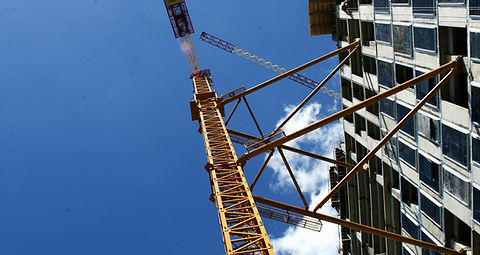

This course will provide the member with the basic knowledge of crane operation, including: erection/ dismantle, inspection, servicing, set-up, and rigging and signaling procedures. Members who successfully complete the rigging/signaling portion of this course will receive a rigging/signaling safety awareness card.
Prerequisite: None.
This course will provide the member with the basic knowledge of mobile crane operation, including: principles of operation, applicable regulations, nomenclature, inspection, load chart calculations, and basic rigging procedures. Members who successfully complete the rigging/signaling portion of this course will receive a rigging/signaling safety awareness card.
Prerequisite: None.


This course will provide the certified crane operator with updated information on crane regulations and load chart procedures.
Prerequisite: Must be a Certified Crane Operator.
This course will provide the member with the basic knowledge of tower crane operation, including: principles of operation, inspection, nomenclature, applicable regulations, load chart calculations, and basic rigging.
Prerequisite: None.


This course will provide the member with the basic knowledge of overhead crane operation, including: principles of operation, applicable regulations, nomenclature, inspection, load chart calculations, and basic rigging procedures.
Prerequisite: None.
This course will provide the member with safety training on rigging and signaling and provide them with the knowledge necessary to satisfy current regulations. Members who successfully complete this course will receive a rigging/signaling safety awareness card.
Prerequisite: None.



This course will provide the member with the basic knowledge of earth moving equipment operation including: scraper, dozer, excavator, loader, and compaction equipment.
Prerequisite: None.
This course will provide the member with more advanced knowledge of earth moving equipment operation, including: scraper, dozer, excavator, backhoe, motor grader, slope board, loader, and various other machines that may be available.
Prerequisite: None.


This course will familiarize the member in basic functions of GPS systems involved with heavy machinery. The course will cover GPS installation, theory, troubleshooting, and operation of the system.
Prerequisite: Must have experience running the equipment that is GPS equipped.
This course will provide the member with the basic knowledge and safety awareness of forklift operations. Members who successfully complete this course will receive a Forklift safety awareness card.
Prerequisite: None.


This course will provide the member with the knowledge involved in grade checking, such as mathematics, stake reading, and slope staking.
Prerequisite: None.
This course will familiarize the member in basic functions of GPS Rover systems and use in the grading industry. The course will cover GPS theory, set-up, troubleshooting, and operation of the system. We currently train using the latest GPS systems.
Prerequisite: Must be an experienced grade checker.


This course will familiarize the member with plan reading.
Prerequisite: Must be an experienced grade checker.
This course will provide the member with both online and hands-on training at our local training sites for preparation of the CDL Class A Drivers License. Effective February 7, 2022 the FMCSA (Federal Motor Carrier Safety Administration) requires all new applicants for obtaining a Commercial Learner's Permit (CLP) must obtain entry-level driver training (ELDT) from an approved training provider registered with the FMCSA database.
Before beginning the CDL License process, members are encouraged to follow the tasks listed below:
-
Participate in online training at our local training site in preparation for the Commercial Learners Permit;
-
Obtain Class A Drivers Commercial Learners Permit;
-
Combination Vehicles Endorsement (those that meet the individual's needs);
-
Current DMV print-out;
-
Current DOT physical.

All of these requirements must be met to be eligible for CDL practical and behind-the-wheel training. Please click HERE for additional information from the State of California DMV website regarding Commercial Driver's Licenses. Appointments for attending CDL training (online and practical tasks) can be made by calling the Whittier office for scheduling. Walk-in participation cannot be guaranteed because of the demand and confirmed appointments made for CDL training. Please be advised that the CA DMV has not yet provided an update to their Commercial Driver's Handbook. Please also be advised that the OETT has discontinued the CDL Packets available in the past because of the new changes made by the FMCSA, which has made the training materials outdated. Please visit the CA DMV website for Driver Handbooks by clicking HERE.

This 24-hour course is provided to IUOE Local 12 members in good standing to prepare for the FAA Part 107 initial aeronautical knowledge test which must be taken at an FAA approved test center at a cost of approximately $175.00. The course is self-paced and completed ONLINE only. The OETT does not provide the test to participants of this course. To pass the aeronautical knowledge test, our drone curriculum will cover the following topics:
-
Applicable regulations relating to small unmanned aircraft system rating privileges, limitations, and flight operation;
-
Airspace classification and operating requirements and flight restrictions affecting small unmanned aircraft operation;
-
Aviation weather sources and effects of weather on small unmanned aircraft performance;
-
Small unmanned aircraft loading and performance;
-
Emergency procedures;
-
Crew resource management;
-
Radio communication procedures;
-
Determining the performance of small unmanned aircraft;
-
Physiological effects of drugs and alcohol;
-
Aeronautical decision-making and judgement;
-
Airport operations;
-
Maintenance and pre-flight inspection procedures;
-
Operations at night.
NOTE: Reimbursement for the cost of a successful completion of the Drone-FAA Part 107, can be obtained through your Local Dispatch Hall



